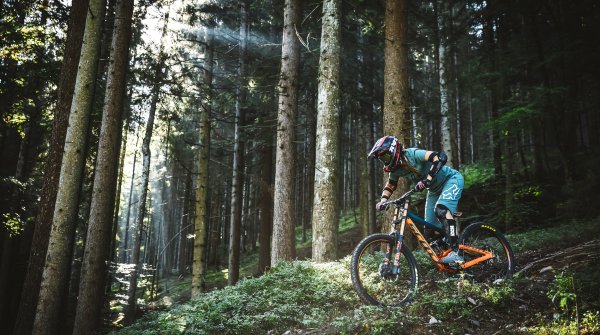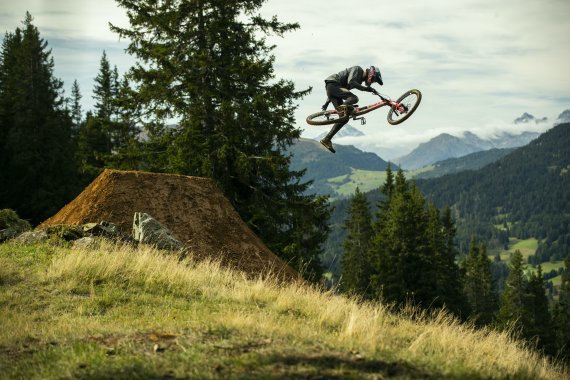
It took just two years for Stefan Schlie's prediction to come true: "Normal mountain bikers will be in the minority in the not too distant future," the e-MTB pro told ispo.com in early 2017.
In 2019, the time had come: 215,500 "organic MTBs" were sold in Germany - and 360,400 e-mountain bikes.
- 2016: 455,250 total mountain bikes, of which 364,500 (80.1%) were organic MTBs and 90,750 (19.9%) were e-MTBs
- 2017: 424,300 total mountain bikes, of which 269,500 (63.5%) were organic MTBs and 154,800 (36.5%) were E-MTBs
- 2018: 516,700 total mountain bikes, of which 271,700 (52.6%) are organic MTBs and 245,000 (47.4%) are E-MTBs
- 2019: 575,900 total mountain bikes, of which 215,500 (37.4%) are bio-MTBs and 360,400 (62.6%) are e-MTBs
Source: Zweirad-Industrie-Verband e.V. (ZIV)
Will the E-MTB completely displace the non-motorized models? That will not happen," saysAndré Schmidt, editor-in-chief of the trade magazine MountainBIKE, says: "After all, high-performance sport continues to take place primarily in the non-motorized sector.in the non-motorized sector, which is also an Olympic sport. But a ratio of 20:80 is conceivable."
So anyone looking at mountain bike trends and innovations in 2021 should not leave out the E-MTB segment. "This is where companies are putting most of their development work," Schmidt says. "Many organic bikers may find that a shame - at the same time, they also benefit from the innovations in components."
Actually funny: In the e-mountain bike segment, where weight hardly played a role thanks to motor assistance, light e-MTBs have recently been causing a stir. With organic mountain bikes, on the other hand, the lightweight trend is over. "This is mainly due to the fact that the bikes are becoming more and more terrain-loving and downhill-heavy," notes André Schmidt.
The journalist sees the main cause in the professional sector, where downhill cross-country trails have sometimes reached downhill levels. Schmidt explains, "Unlike skiing or Formula 1, professional and recreational mountain bikers use almost identical equipment."
The challenge of "light uphill, stable downhill" just can't be solved: "If I want a stable 29-inch tire, with puncture protection and a carcass that won't buckle, then it weighs a kilo," says Schmidt.
In terms of mountain bikes in 2021 not much. "I don't see anything groundbreaking like clipless pedals, 29ers, variable seatposts or 1x12 gears were - these innovations have permanently changed the way we bike," Schmidt says. "Currently we are talking a lot about electronics on the bike and safety systems. In the e-MTB segment, the topic of light e-MTBs is certainly the most exciting."
Derived from Trend 1, the term "down country" has become established, and demand is growing. "A term of art made up of downhill and cross country - ultimately these are race bikes with an extra portion of riding fun," André Schmidt sums it up. So a bit more stable, with more suspension travel front and rear (120 mm) and also with vario seatposts. "Actually a great category, because the bikes are not so heavy."
So the segmentation continues. "For us, it's not so easy to convey: Where does cross country end and where does down country begin?" says Schmidt and warns, "There's a danger in that that people won't see through it at some point and will react increasingly dismissively. In the past, there was just one wheel for up and one for down."
One category, on the other hand, hardly plays a role anymore, says Schmidt: "You hear all-mountain less and less, it's a German term anyway, in English they're called trail bikes."
More differentiation in the market also means less individualization. "In the past, there was definitely more screwing and optimizing on the bikes," Schmidt says, "but today the bike is bought and used as a whole."
On the one hand, because construction and components have become much more complex, and on the other, "because the bikes are so well tuned out of the box that it's not really worth it," says Schmidt, citing an example:
"In a 3,000-euro mountain bike, good suspension forks are installed, not the top model, but absolutely high-quality. The top model from Fox alone costs 1,000 euros - that's simply not worth it. And in case of doubt, I even worsen the driving experience, because the manufacturers now match the components very well."
In the case of E-MTBs, independent optimization is prohibited anyway: "You should rather not touch anything yourself - except in the area of wear parts - because that can become a legal warranty problem," says Schmidt.
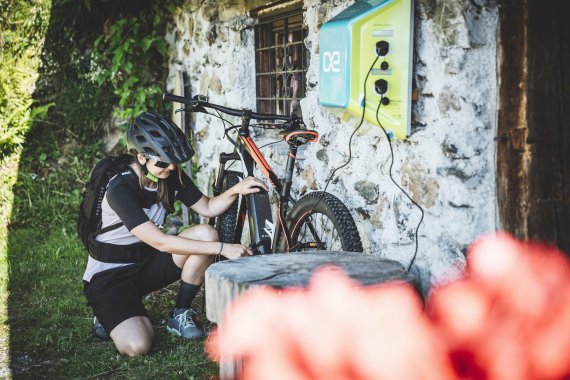
"Ten years ago, I sold one mountain bike per month for over 3,000 euros, but today I sell almost exclusively in this price segment," reports a dealer from Upper Bavaria.
On the one hand, this is due to the high demand for e-mountain bikes, which are naturally more expensive. On the other hand, price tolerance among customers has risen massively, as the average price has risen even for non-motorized bikes.
"Thus, the trend towards branded products and vehicles with high quality continues, as in previous years," informs the Two-Wheeler Industry Association (ZIV) after the record year 2019, citing multiple reasons: "technical innovations, high attractiveness of the vehicles, but also the increase in the importance of bicycles and e-bikes for everyday mobility."
In the Corona crisis of 2020, demand increased to such an extent that bicycle dealers had to report "sold out!" for many models. For the mountain bike business in 2021, this means: Manufacturers are screwing almost more on their prices than on their bikes and are testing the pain threshold.
Even the most die-hard organic mountain bikers have long since realized: The triumph of E-MTBs can no longer be stopped. "There are still some among our readers who categorically reject e-mountain bikes," says André Schmidt, "but we treat it as an equal. Most in our editorial team ride both - me as well."
The 47-year-old uses his e-mountain bike primarily in everyday life, for shopping and as a family carriage with a child trailer: "I don't see the e-MTB as a betrayal of mountain biking. It gets more people on bikes and out of the cities. And that's good."
Riding a bike is one of the most popular sports among Germans - and not just since Corona. This also applies more and more to mountain biking, where the E-MTs are acting as a gamechanger. "The first generation of mountain bikers has long had children of their own who can conquer the mountain with the e-bike as a lift," says André Schmidt.
As "Mountainbike" editor-in-chief, he could also see that supplements and special issues on the subject of children and mountain biking are very well received: "The industry is in the process of developing new and better things for this target group - there's still a lot of potential there."
This also applies to women as a target group. Special (e-)mountain bikes for women have long been standard, but bike destinations are now also targeting women. "There are more and more women in our MTB schools and camps, so we're expanding the offer," reports Marco Pointner, managing director of the Saalfelden-Leogang Tourism Association.
The Epic Bikepark, 80 kilometers south of Salzburg, now also offers more moderate, wider trails. Pointner is particularly proud of the practice course at the valley station: "The Riders Playground, in which we have invested massively in recent years, is perfect for young and old to learn mountain biking from scratch.
We think of it like skiing, where beginners also work their way up the mountain slowly at first."
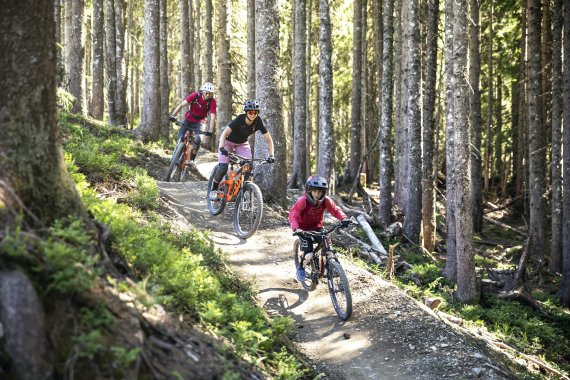
While long-distance destinations suffered massive losses during the Corona crisis, most mountain bikesten mountain bike areas have come through the year very well. "This crisis summer in particular has shown that our focus on biking has paid off," says Pointner: "Without this specialization, we would not have experienced these good summer months."
Marc Schlüssel, marketing manager in the Swiss area of Arosa / Lenzerheide, has even experienced a record year thanks to an expanded bike park offering: "By the end of October, we had booked 35 percent more overnight stays - although we were almost completely closed in May and June," he reports.
With the new Bike Kingdom, which opened with much fanfare on June 6, 2020, the region has further strengthened its position as the number one bike destination in Switzerland.ation number one in Switzerland, says Schlüssel: "Summer tourism is gaining in importance not only here, but perhaps even more so thanks to Corona. More and more regions are focusing on mountain biking. I believe we are still a long way from reaching our zenith."
Even the most die-hard bio-mountain bikers have long since realized The triumph of the E-MTBs is unstoppable. "There are still some among our readers who categorically reject e-mountainbikes," says André Schmidt, "but we treat them equally. Most of the people in our editorial department ride both - and so do I."
The 47-year-old uses his e-mountain bike primarily in everyday life, for shopping and as a family carriage with a children's trailer: "I don't see the e-mtb as a betrayal of mountain biking. It gets more people on their bikes and out of the cities. And that's good."
Cycling is one of the most popular sports in Germany - and not just since Corona. This also applies more and more to mountain biking, where the E-MTBs act as game changers. "The first generation of mountain bikes has long since had children themselves, who can conquer the mountain with the e-bike as a lift," says André Schmidt.
As "Mountain Bike" editor-in-chief, he also noticed that supplements and special editions on the subject of children and mountain biking are very well received: "The industry is in the process of developing new and better things for this target group - there is still a lot of potential in this area".
This also applies to women as a target group. Special (e-)mountain bikes for women have long been standard, but bike destinations are now also specifically targeting women. "In our MTB schools and camps, women are increasingly to be found, so we are expanding our range of offers", reports Marco Pointner, Managing Director of the Saalfelden-Leogang Tourism Association.
The Epic Bikepark, 80 kilometres south of Salzburg, therefore now also offers more moderate, broader trails. Pointner is particularly proud of the practice course at the valley station: "The Riders Playground, in which we have invested massively in recent years, is perfect for young and old to learn mountain biking from the ground up. We think it's like skiing, where beginners can also slowly work their way up the mountain".

Cycling is one of the most popular sports in Germany - and not just since Corona. This also applies more and more to mountain biking, where the E-MTBs act as game changers. "The first generation of mountain bikes has long since had children themselves, who can conquer the mountain with the e-bike as a lift," says André Schmidt.
As "Mountain Bike" editor-in-chief, he also noticed that supplements and special editions on the subject of children and mountain biking are very well received: "The industry is in the process of developing new and better things for this target group - there is still a lot of potential in this area".
This also applies to women as a target group. Special (e-)mountain bikes for women have long been standard, but bike destinations are now also specifically targeting women. "In our MTB schools and camps, women are increasingly to be found, so we are expanding our range of offers", reports Marco Pointner, Managing Director of the Saalfelden-Leogang Tourism Association.
The Epic Bikepark, 80 kilometres south of Salzburg, therefore now also offers more moderate, broader trails. Pointner is particularly proud of the practice course at the valley station: "The Riders Playground, in which we have invested massively in recent years, is perfect for young and old to learn mountain biking from the ground up. We think it's like skiing, where beginners can also slowly work their way up the mountain".
What do you think the mountain bike industry will expect in the coming years? Have we missed an important trend? Feel free to write us in the comments.
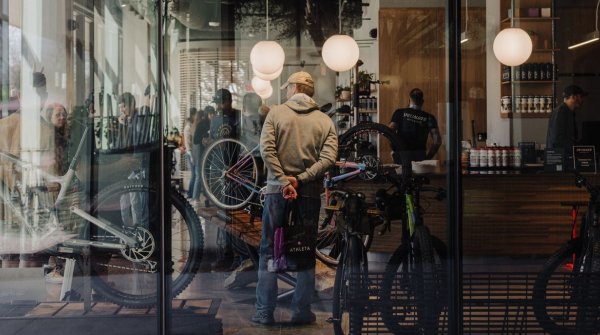 Sports BusinessThe future of the bike industry: 6 innovative bike stores
Sports BusinessThe future of the bike industry: 6 innovative bike stores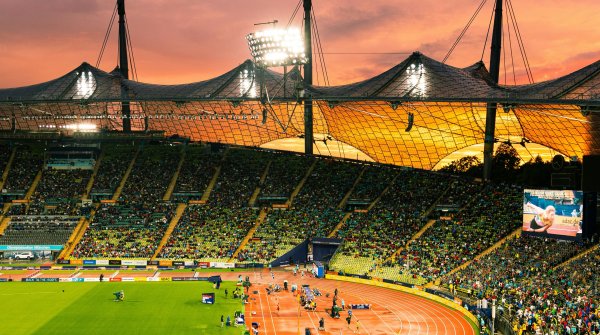
- ISPO awards
- Mountain sports
- Bike
- Design
- Retail
- Fitness
- Health
- ISPO Job Market
- ISPO Munich
- ISPO Shanghai
- Running
- Brands
- Sustainability
- Olympia
- OutDoor
- Promotion
- Sports Business
- ISPO Textrends
- Triathlon
- Water sports
- Winter sports
- eSports
- SportsTech
- OutDoor by ISPO
- Heroes
- Transformation
- Sport Fashion
- Urban Culture
- Challenges of a CEO
- Trade fairs
- Sports
- Find the Balance
- Product reviews
- Newsletter Exclusive Area
- Magazine



